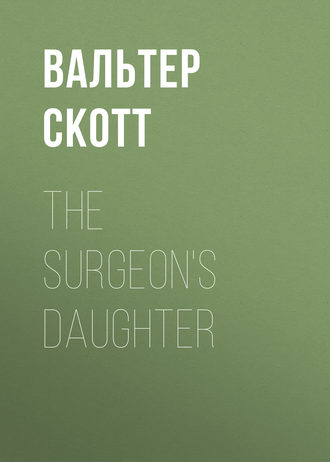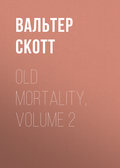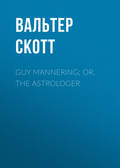
Вальтер Скотт
The Surgeon's Daughter
Mr. Goodriche, the Catholic priest, demanded access to her upon one occasion. She at first declined his visit, but afterwards received it, under the idea, perhaps, that he might have news from Mr. Middlemas, as he called himself. The interview was a very short one, and the priest left the lady’s apartment in displeasure, which his prudence could scarce disguise from Mr. Gray. He never returned, although the lady’s condition would have made his attentions and consolations necessary, had she been a member of the Catholic Church.
Our Doctor began at length to suspect his fair guest was a Jewess, who had yielded up her person and affections to one of a different religion; and the peculiar style of her beautiful countenance went to enforce this opinion. The circumstance made no difference to Gray, who saw only her distress and desolation, and endeavoured to remedy both to the utmost of his power. He was, however, desirous to conceal it from his wife, and the others around the sick person, whose prudence and liberality of thinking might be more justly doubted. He therefore so regulated her diet, that she could not be either offended, or brought under suspicion, by any of the articles forbidden by the Mosaic law being presented to her. In other respects than what concerned her health or convenience, he had but little intercourse with her.
The space passed within which the stranger’s return to the borough had been so anxiously expected by his female companion. The disappointment occasioned by his non-arrival was manifested in the convalescent by inquietude, which was at first mingled with peevishness, and afterwards with doubt and fear. When two or three days had passed without message or letter of any kind, Gray himself became anxious, both on his own account and the poor lady’s, lest the stranger should have actually entertained the idea of deserting this defenceless and probably injured woman. He longed to have some communication with her, which might enable him to judge what enquiries could be made, or what else was most fitting to be done. But so imperfect was the poor young woman’s knowledge of the French language, and perhaps so unwilling she herself to throw any light on her situation, that every attempt of this kind proved abortive. When Gray asked questions concerning any subject which appeared to approach to explanation, he observed she usually answered him by shaking her head, in token of not understanding what he said; at other times by silence and with tears, and sometimes referring him to Monsieur.
For Monsieur’s arrival, then, Gray began to become very impatient, as that which alone could put an end to a disagreeable species of mystery, which the good company of the borough began now to make the principal subject of their gossip; some blaming Gray for taking foreign landloupers [Footnote: Strollers.] into his house, on the subject of whose morals the most serious doubts might be entertained; others envying the “bonny hand” the doctor was like to make of it, by having disposal of the wealthy stranger’s travelling funds; a circumstance which could not be well concealed from the public, when the honest man’s expenditure for trifling articles of luxury came far to exceed its ordinary bounds.
The conscious probity of the honest Doctor enabled him to despise this sort of tittle-tattle, though the secret knowledge of its existence could not be agreeable to him. He went his usual rounds with his usual perseverance, and waited with patience until time should throw light on the subject and history of his lodger. It was now the fourth week after her confinement, and the recovery of the stranger might be considered as perfect, when Gray, returning from one of his ten-mile visits, saw a post-chaise and four horses at the door. “This man has returned,” he said, “and my suspicions have done him less than justice.” With that he spurred his horse, a signal which the trusty steed obeyed the more readily, as its progress was in the direction of the stable door. But when, dismounting, the Doctor hurried into his own house, it seemed to him, that the departure as well as the arrival of this distressed lady was destined to bring confusion to his peaceful dwelling. Several idlers had assembled about his door, and two or three had impudently thrust themselves forward almost into the passage, to listen to a confused altercation which was heard from within.
The Doctor hastened forward, the foremost of the intruders retreating in confusion on his approach, while he caught the tones of his wife’s voice, raised to a pitch which he knew, by experience, boded no good; for Mrs. Gray, good-humoured and tractable in general, could sometimes perform the high part in a matrimonial duet. Having much more confidence in his wife’s good intentions than her prudence, he lost no time in pushing into the parlour, to take the matter into his own hands. Here he found his helpmate at the head of the whole militia of the sick lady’s apartment, that is, wet nurse, and sick nurse, and girl of all work, engaged in violent dispute with two strangers. The one was a dark-featured elderly man, with an eye of much sharpness and severity of expression, which now seemed partly quenched by a mixture of grief and mortification. The other, who appeared actively sustaining the dispute with Mrs. Gray, was a stout, bold-looking, hard-faced person, armed with pistols, of which he made rather an unnecessary and ostentatious display.
“Here is my husband, sir,” said Mrs. Gray, in a tone of triumph, for she had the grace to believe the Doctor one of the greatest men living, – “Here is the Doctor – let us see what you will say now.”
“Why just what I said before, ma’am,” answered the man, “which is, that my warrant must be obeyed. It is regular, ma’am, regular.”
So saying, he struck the forefinger of his right hand against a paper which he held towards Mrs. Gray with his left.
“Address yourself to me, if you please, sir,” said the Doctor, seeing that he ought to lose no time in removing the cause into the proper court. “I am the master of this house, sir, and I wish to know the cause of this visit.”
“My business is soon told,” said the man. “I am a king’s messenger, and this lady has treated me as if I was a baron-bailie’s officer.”
“That is not the question, sir,” replied the Doctor. “If you are a king’s messenger, where is your warrant, and what do you propose to do here?” At the same time he whispered the little wench to call Mr. Lawford, the town-clerk, to come thither as fast as he possibly could. The good-daughter of Peg Thomson started off with an activity worthy of her mother-in-law.
“There is my warrant,” said the official, “and you may satisfy yourself.”
“The shameless loon dare not tell the Doctor his errand,” said Mrs. Gray exultingly.
“A bonny errand it is,” said old Lucky Simson, “to carry away a lying-in woman as a gled [Footnote: Or Kite.] would do a clocking-hen.”
“A woman no a month delivered” – echoed the nurse Jamieson.
“Twenty-four days eight hours and seven minutes to a second,” said Mrs. Gray.
The Doctor having looked over the warrant, which was regular, began to be afraid that the females of his family, in their zeal for defending the character of their sex, might be stirred up into some sudden fit of mutiny, and therefore commanded them to be silent.
“This,” he said, “is a warrant for arresting the bodies of Richard Tresham, and of Zilia de Moncada on account of high treason. Sir, I have served his Majesty, and this is not a house in which traitors are harboured. I know nothing of any of these two persons, nor have I ever heard even their names.”
“But the lady whom you have received into your family,” said the messenger, “is Zilia de Moncada, and here stands her father, Matthias de Moncada, who will make oath to it.”
“If this be true,” said Mr. Gray, looking towards the alleged officer, “you have taken a singular duty on you. It is neither my habit to deny my own actions, nor to oppose the laws of the land. There is a lady in this house slowly recovering from confinement, having become under this roof the mother of a healthy child. If she be the person described in this warrant, and this gentleman’s daughter, I must surrender her to the laws of the country.”
Here the Esculapian militia were once more in motion.
“Surrender, Dr. Gray! It’s a shame to hear you speak, and you that lives by women and weans, abune your other means!” so exclaimed his fair better part.
“I wonder to hear the Doctor!” said the younger nurse; “there’s no a wife in the town would believe it o’ him.”
“I aye thought the Doctor was a man till this moment,” said Luckie Simson; “but I believe him now to be an auld wife, little baulder than mysell; and I dinna wonder that poor Mrs. Gray” —
“Hold your peace, you foolish woman,” said the Doctor. “Do you think this business is not bad enough already, that you are making it worse with your senseless claver? [Footnote: Tattling.] – Gentlemen, this is a very sad case. Here is a warrant for a high crime against a poor creature, who is little fit to be removed from one house to another, much more dragged to a prison. I tell you plainly, that I think the execution of this arrest may cause her death. It is your business, sir, if you be really her father, to consider what you can do to soften this matter, rather than drive it on.”
“Better death than dishonour,” replied the stern-looking old man, with a voice as harsh as his aspect; “and you, messenger,” he continued, “look what you do, and execute the warrant at your peril.”
“You hear,” said the man, appealing to the Doctor himself, “I must have immediate access to the lady.”
“In a lucky time,” said Mr. Gray, “here comes the town-clerk. – You are very welcome, Mr. Lawford. Your opinion here is much wanted as a man of law, as well as of sense and humanity. I was never more glad to see you in all my life.”
He then rapidly stated the case; and the messenger, understanding the new-comer to be a man of some authority, again exhibited his warrant.
“This is a very sufficient and valid warrant, Dr. Gray,” replied the man of law. “Nevertheless, if you are disposed to make oath, that instant removal would be unfavourable to the lady’s health, unquestionably she must remain here, suitably guarded.”
“It is not so much the mere act of locomotion which I am afraid of,” said the surgeon; “but I am free to depone, on soul and conscience, that the shame and fear of her father’s anger, and the sense of the affront of such an arrest, with terror for its consequences, may occasion violent and dangerous illness – even death itself.”
“The father must see the daughter, though they may have quarrelled,” said Mr. Lawford; “the officer of justice must execute his warrant though it should frighten the criminal to death; these evils are only contingent, not direct and immediate consequences. You must give up the lady, Mr. Gray, though your hesitation is very natural.”
“At least, Mr. Lawford, I ought to be certain that the person in my house is the party they search for.”
“Admit me to her apartment,” replied the man whom the messenger termed Moncada.
The messenger, whom the presence of Lawford had made something more placid, began to become impudent once more. He hoped, he said, by means of his female prisoner, to acquire the information necessary to apprehend the more guilty person. If more delays were thrown in his way, that information might come too late, and he would make all who were accessary to such delay responsible for the consequences.
“And I,” said Mr. Gray, “though I were to be brought to the gallows for it, protest, that this course may be the murder of my patient. – Can bail not be taken, Mr. Lawford?”
“Not in cases of high treason,” said the official person; and then continued in a confidential tone, “Come, Mr. Gray, we all know you to be a person well affected to our Royal Sovereign King George and the Government; but you must not push this too far, lest you bring yourself into trouble, which every body in Middlemas would be sorry for. The forty-five has not been so far gone by, but we can remember enough of warrants of high treason – ay, and ladies of quality committed upon such charges. But they were all favourably dealt with – Lady Ogilvy, Lady Macintosh, Flora Macdonald, and all. No doubt this gentleman knows what he is doing, and has assurances of the young lady’s safety – So you must jouk and let the jaw gae by, as we say.”
“Follow me, then, gentleman,” said Gideon, “and you shall see the young lady;” and then, his strong features working with emotion at anticipation of the distress which he was about to inflict, he led the way up the small staircase, and opening the door, said to Moncada, who had followed him, “This is your daughter’s only place of refuge, in which I am, alas! too weak to be her protector. Enter, sir, if your conscience will permit you.”
The stranger turned on him a scowl, into which it seemed as if he would willingly have thrown the power of the fabled basilisk. Then stepping proudly forward, he stalked into the room. He was followed by Lawford and Gray at a little distance. The messenger remained in the doorway. The unhappy young woman had heard the disturbance, and guessed the cause too truly. It is possible she might even have seen the strangers on their descent from the carriage. When they entered the room, she was on her knees, beside an easy chair, her face in a silk wrapper that was hung over it. The man called Moncada uttered a single word; by the accent it might have been something equivalent to wretch; but none knew its import. The female gave a convulsive shudder, such as that by which a half-dying soldier is affected on receiving a second wound. But, without minding her emotion, Moncada seized her by the arm, and with little gentleness raised her to her feet, on which she seemed to stand only because she was supported by his strong grasp. He then pulled from her face the mask which she had hitherto worn. The poor creature still endeavoured to shroud her face, by covering it with her left hand, as the manner in which she was held prevented her from using the aid of the right. With little effort her father secured that hand also, which indeed was of itself far too little to serve the purpose of concealment, and showed her beautiful face, burning with blushes and covered with tears.
“You, Alcalde, and you, Surgeon,” he said to Lawford and Gray, with a foreign action and accent, “this woman is my daughter, the same Zilia Moncada who is signal’d in that protocol. Make way, and let me carry her where her crimes may be atoned for.”
“Are you that person’s daughter?” said Lawford to the lady.
“She understands no English,” said Gray; and addressing his patient in French, conjured her to let him know whether she was that man’s daughter or not, assuring her of protection if the fact were otherwise. The answer was murmured faintly, but was too distinctly intelligible – “He was her father.”
All farther title of interference seemed now ended. The messenger arrested his prisoner, and, with some delicacy, required the assistance of the females to get her conveyed to the carriage in waiting.
Gray again interfered. – “You will not,” he said, “separate the mother and the infant?”
Zilia de Moncada heard the question, (which, being addressed to the father, Gray had inconsiderately uttered in French,) and it seemed as if it recalled to her recollection the existence of the helpless creature to which she had given birth, forgotten for a moment amongst the accumulated horrors of her father’s presence. She uttered a shriek, expressing poignant grief, and turned her eyes on her father with the most intense supplication.
“To the parish with the bastard!” – said Moncada; while the helpless mother sunk lifeless into the arms of the females, who had now gathered round her.
“That will not pass, sir,” said Gideon. – “If you are father to that lady, you must be grandfather to the helpless child; and you must settle in some manner for its future provision, or refer us to some responsible person.”
Moncada looked towards Lawford, who expressed himself satisfied of the propriety of what Gray said.
“I object not to pay for whatever the wretched child may require,” said he; “and if you, sir,” addressing Gray, “choose to take charge of him, and breed him up, you shall have what will better your living.”
The Doctor was about to refuse a charge so uncivilly offered; but after a moment’s reflection, he replied, “I think so indifferently of the proceedings I have witnessed, and of those concerned in them, that if the mother desires that I should retain the charge of this child, I will not refuse to do so.”
Moncada spoke to his daughter, who was just beginning to recover from her swoon, in the same language in which he had at first addressed her. The proposition which he made seemed highly acceptable, as she started from the arms of the females, and, advancing to Gray, seized his hand, kissed it, bathed it in her tears, and seemed reconciled, even in parting with her child, by the consideration, that the infant was to remain under his guardianship.
“Good, kind man,” she said in her indifferent French, “you have saved both mother and child.”
The father, meanwhile, with mercantile deliberation, placed in Mr. Lawford’s hands notes and bills to the amount of a thousand pounds, which he stated was to be vested for the child’s use, and advanced in such portions as his board and education might require. In the event of any correspondence on his account being necessary, as in case of death or the like, he directed that communication should be made to Signor Matthias Moncada, under cover to a certain banking house in London.
“But beware,” he said to Gray, “how you trouble me about these concerns, unless in case of absolute necessity.”
“You need not fear, sir,” replied Gray; “I have seen nothing to-day which can induce me to desire a more intimate correspondence with you than may be indispensable.”
While Lawford drew up a proper minute of this transaction, by which he himself and Gray were named trustees for the child, Mr. Gray attempted to restore to the lady the balance of the considerable sum of money which Tresham (if such was his real name) had formally deposited with him. With every species of gesture, by which hands, eyes, and even feet, could express rejection, as well as in her own broken French, she repelled the reimbursement, while she entreated that Gray would consider the money as his own property; and at the same time forced upon him a ring set with brilliants, which seemed of considerable value. The father then spoke to her a few stern words, which she heard with an air of mingled agony and submission.
“I have given her a few minutes to see and weep over the miserable being which has been the seal of her dishonour,” said the stern father. “Let us retire and leave her alone. – You,” to the messenger, “watch the door of the room on the outside.”
Gray, Lawford, and Moncada, retired to the parlour accordingly, where they waited in silence, each busied with his own reflections, till, within the space of half an hour, they received information that the lady was ready to depart.
“It is well,” replied Moncada; “I am glad she has yet sense enough left to submit to that which needs must be.”
So saying, he ascended the stair, and returned leading down his daughter, now again masked and veiled. As she passed Gray, she uttered the words – “My child, my child!” in a tone of unutterable anguish; then entered the carriage, which was drawn up as close to the door of the doctor’s house as the little enclosure would permit. The messenger, mounted on a led horse, and accompanied by a servant and assistant, followed the carriage, which drove rapidly off, taking the road which leads to Edinburgh. All who had witnessed this strange scene, now departed to make their conjectures, and some to count their gains; for money had been distributed among the females who had attended on the lady, with so much liberality, as considerably to reconcile them to the breach of the rights of womanhood inflicted by the precipitate removal of the patient.







